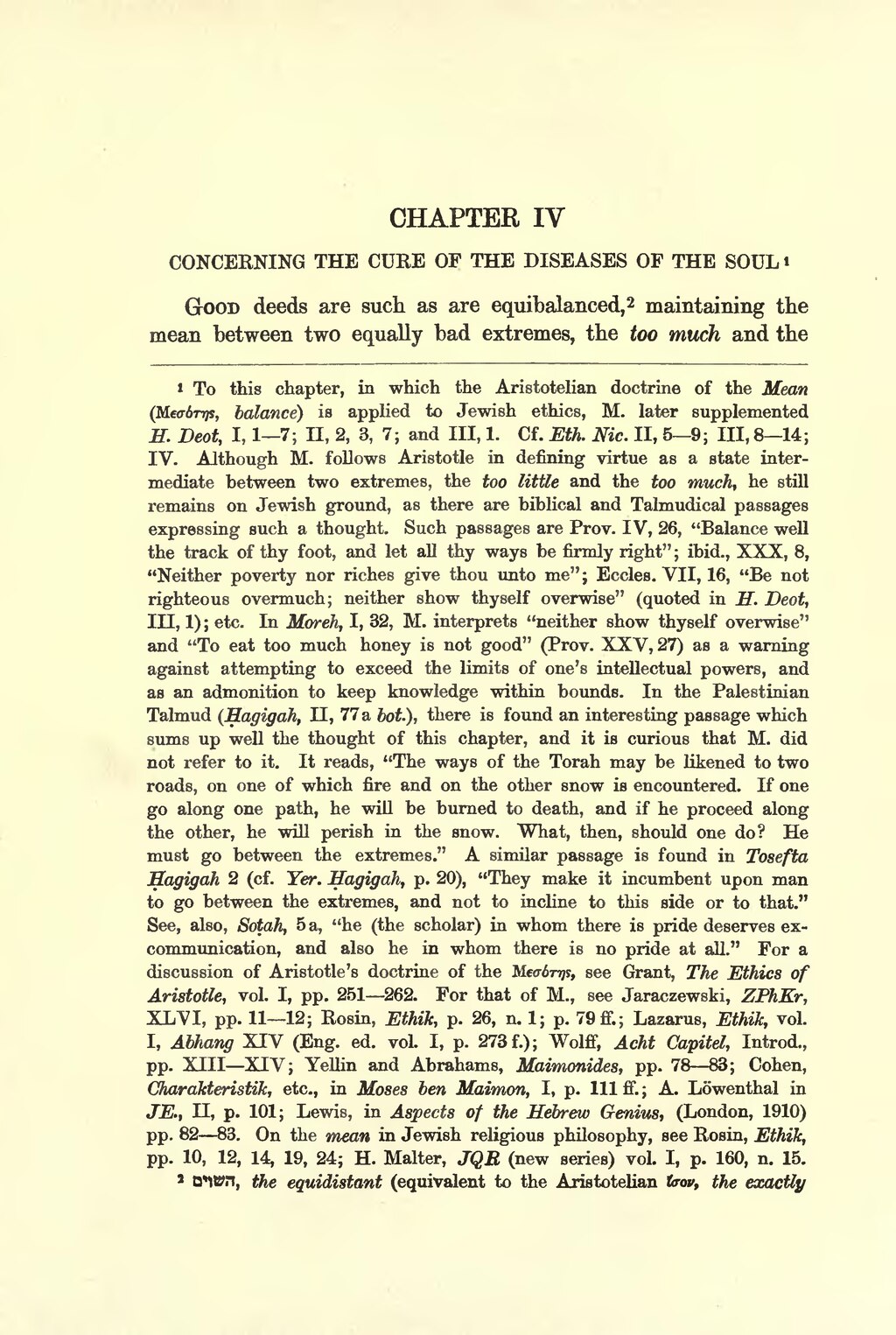This page has been validated.
Chapter IV
Concerning the Cure of the Diseases of the Soul[1]
Good deeds are such as are equibalanced,[2] maintaining the mean between two equally bad extremes, the too much and the
- ↑ To this chapter, in which the Aristotelian doctrine of the Mean (Μεσότες, balance) is applied to Jewish ethics, M. later supplemented H. Deot, I, 1—7; II, 2, 3, 7; and III, 1. Cf. Eth. Nic. II, 5—9; III, 8—14; IV. Although M. follows Aristotle in defining virtue as a state intermediate between two extremes, the too little and the too much, he still remains on Jewish ground, as there are biblical and Talmudical passages expressing such a thought. Such passages are Prov. IV, 26, "Balance well the track of thy foot, and let all thy ways be firmly right"; ibid., XXX, 8, "Neither poverty nor riches give thou unto me"; Eccles. VII, 16, "Be not righteous overmuch; neither show thyself overwise" (quoted in H. Deot, III, 1); etc. In Moreh, I, 32, M. interprets "neither show thyself overwise" and "To eat too much honey is not good" (Prov. XXV, 27) as a warning against attempting to exceed the limits of one's intellectual powers, and as an admonition to keep knowledge within bounds. In the Palestinian Talmud (Ḥagigah, II, 77 a bot.), there is found an interesting passage which sums up well the thought of this chapter, and it is curious that M. did not refer to it. It reads, "The ways of the Torah may be likened to two roads, on one of which fire and on the other snow is encountered. If one go along one path, he will be burned to death, and if he proceed along the other, he will perish in the snow. What, then, should one do? He must go between the extremes." A similar passage is found in Tosefta Ḥagigah 2 (cf. Yer. Ḥagigah, p. 20), "They make it incumbent upon man to go between the extremes, and not to incline to this side or to that." See, also, Soṭah, 5a, "he (the scholar) in whom there is pride deserves excommunication, and also he in whom there is no pride at all." For a discussion of Aristotle's doctrine of the Μεσότες, see Grant, The Ethics of Aristotle, vol. I, pp. 251—262. For that of M., see Jaraczewski, ZPhKr, XLVI, pp. 11—12; Rosin, Ethik, p. 26, n. 1; p. 79 ff.; Lazarus, Ethik, vol. I, Abhang XIV (Eng. ed. vol. I, p. 273 f.); Wolff, Acht Capitel, Introd., pp. XIII—XIV; Yellin and Abrahams, Maimonides, pp. 78—83; Cohen, Charakteristik, etc., in Moses ben Maimon, I, p. III ff.; A. Löwenthal in JE., II, p. 101; Lewis, in Aspects of the Hebrew Genius, (London, 1910) pp. 82—83. On the mean in Jewish religious philosophy, see Rosin, Ethik, pp. 10, 12, 14, 19, 24; H. Malter, JQR (new series) vol. I, p. 160, n. 15.
- ↑ השױס, the equidistant (equivalent to the Aristotelian ίσον, the exactly
